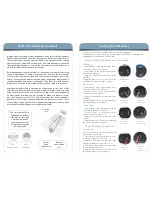
Toll Free:
8 0 0 - 8 2 8 - 8 1 8 4
Phone:
4 0 6 - 5 8 7 - 9 4 6 6
Fax:
4 0 6 - 5 8 7 - 9 4 8 4
2020
Gilkerson
Drive
Bozeman,
MT
59715
w w w . h e a d p h o n e . c o m
Contacting HeadRoom
A Word About
Your Hearing
People have a natural tendency to listen to music at much louder levels with
headphones than they would with speakers. To avoid permanent hearing
damage, it’s important to be careful not to listen at extremely loud levels (or
to listen for too long at moderately loud levels). Because HeadRoom amps
need to be able to drive even the most ineffi cient dynamic headphones to
satisfactory listening levels, they are also able to drive headphones of aver-
age or higher effi ciencies to extremely high levels. As a result, even though
the volume control on your HeadRoom amp may appear to be set to a low
level, you may not be listening at a safe level. Generally speaking, when lis-
tening to headphones you should only turn up the volume to the point at
which the sound isn’t too quiet.
As a general rule, sound pressure levels under 80 decibels will not damage
hearing, even if experienced continually. On the other hand, anything over
100 decibels may cause permanent damage very quickly. Sustained expo-
sure to sound pressure levels anywhere in between can also be damaging
—the louder the sound, the shorter the time required to cause permanent
damage.
Just to drive this message home, here’s a bit of information about hearing
damage. The most common type of damage caused by prolonged or exces-
sively loud sound is called tinnitus. It manifests itself as a sustained buzzing
and/or ringing in the ears, and can become a permanent condition.
If you fi nd that your ears are ringing or that there is a sensation of pressure or
fatigue, your body is trying to tell you that your ears need a break. Give them
a rest for a few days (or until they feel fresh). If you ignore these symptoms,
you’re risking permanent hearing damage.
In addition, don’t fool yourself into thinking that you either have full-blown
tinnitus or you don’t have it at all—there are different degrees of hearing
damage. For example, you might have a mild case where you only notice ring-
ing in your ears in the quiet of your bedroom at night. However, once you
have a slight case of tinnitus, your ears are much more susceptible to further
damage. So if you do experience mild symptoms, it’s important to be much
more careful about your exposure to loud sounds.
Sorry to sound so sobering, but a lifetime of musical enjoyment requires ears
in tiptop shape. Now that we’ve told you to be careful, don’t blame us if you
blow it. If you have any more questions about hearing damage, call a doctor.

























